Econometric Tools for Macroeconomic Forecasting and Simulation
The aim of this research group is to enhance research on, and development, implementation, evaluation, and application of quantitative macroeconometric models for forecasting and analysing aggregate economic fluctuations and developments. Research in this group contributes to the econometric foundation and the methodological improvements of the IWH forecasts. During the last years, the IWH has highly specialised in macroeconomic modelling, both for flash estimates and medium-term projections. Furthermore, this group conducts comprehensive empirical analysis and develops econometric tools that are used for third-party funded projects. In the last years, particular models have been developed for e.g. Volkswagen Financial Services AG and for GIZ. The research group contributed in particular on macroeconomic modelling for ministries in Kyrgyzstan and Tajikistan as well as for the institute of forecasting and macroeconomic research (IFMR) Uzbekistan.
IWH Data Project: IWH Real-time Database
Research Cluster
Economic Dynamics and StabilityYour contact

Mitglied - Department Macroeconomics
EXTERNAL FUNDING
07.2022 ‐ 12.2026
Evaluation of the InvKG and the federal STARK programme
German Federal Ministry for Economic Affairs and Climate Action
On behalf of the Federal Ministry of Economics and Climate Protection, the IWH and the RWI are evaluating the use of the approximately 40 billion euros the federal government is providing to support the coal phase-out regions..
10.2019 ‐ 01.2023
Climate Resilient Economic Development
Deutsche Gesellschaft für Internationale Zusammenarbeit (GIZ) GmbH
Climate change has a substantial impact on economic growth and a country’s development. This increases the need for reliable and viable approaches to assessing the impact of climate risks and potential adaptation scenarios. Political decision-makers in ministries of planning and economy need sound forecasts in order to design and finance adequate economic policy instruments and actively to take countermeasures. In the pilot countries (Georgia, Kazakhstan and Vietnam), climate risk is included in macroeconomic modelling, enabling the results to be integrated into the policy process so as to facilitate adapted economic planning. The IWH team is responsible for macroeconomic modelling in Vietnam.
05.2020 ‐ 09.2023
ENTRANCES: Energy Transitions from Coal and Carbon: Effects on Societies
European Commission
ENTRANCES aims at examining the effects of the coal phase-out in Europe. How does the phase-out transform society – and what can politics do about it?
This project has received funding from the European Union’s Horizon 2020 research and innovation programme under grant agreement No 883947.
01.2018 ‐ 12.2023
EuropeAid (EU Framework Contract)
European Commission
07.2016 ‐ 12.2018
Climate Protection and Coal Phaseout: Political Strategies and Measures up to 2030 and beyond
Umweltbundesamt (UBA)
01.2017 ‐ 12.2017
Support to Sustainable Economic Development in Selected Regions of Uzbekistan
Deutsche Gesellschaft für Internationale Zusammenarbeit (GIZ) GmbH
01.2017 ‐ 12.2017
Short-term Macroeconomic Forecasting Model in Ministry of Economic Development and Trade of Ukraine
Deutsche Gesellschaft für Internationale Zusammenarbeit (GIZ) GmbH
01.2016 ‐ 12.2017
Development of analytical tools based on Input-Output table
Deutsche Gesellschaft für Internationale Zusammenarbeit (GIZ) GmbH
The aim of the project was the development of an analytical tool to assess the gains and losses of possible state programs supporting the development of the private sector of the Tajik economy.
11.2015 ‐ 12.2016
Employment and Development in the Republic of Uzbekistan
Deutsche Gesellschaft für Internationale Zusammenarbeit (GIZ) GmbH
Support to sustainable economic development in selected regions of Uzbekistan
05.2016 ‐ 05.2016
Framework and Finance for Private Sector Development in Tajikistan
Deutsche Gesellschaft für Internationale Zusammenarbeit (GIZ) GmbH
02.2016 ‐ 04.2016
Macroeconomic Reforms and Green Growth - Assessment of economic modelling capacity in Vietnam
Deutsche Gesellschaft für Internationale Zusammenarbeit (GIZ) GmbH
Refereed Publications
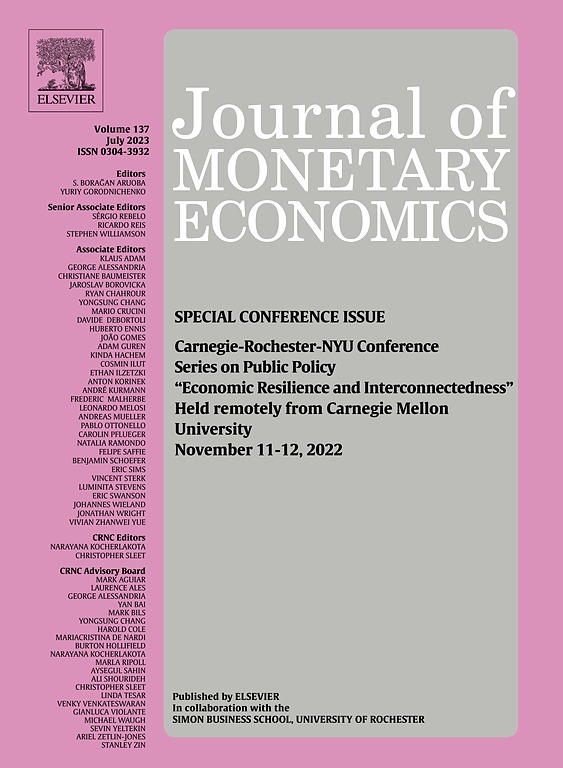
Understanding Post-Covid Inflation Dynamics
in: Journal of Monetary Economics, November 2023
Abstract
We propose a macroeconomic model with a nonlinear Phillips curve that has a flat slope when inflationary pressures are subdued and steepens when inflationary pressures are elevated. The nonlinear Phillips curve in our model arises due to a quasi-kinked demand schedule for goods produced by firms. Our model can jointly account for the modest decline in inflation during the Great Recession and the surge in inflation during the post-COVID period. Because our model implies a stronger transmission of shocks when inflation is high, it generates conditional heteroskedasticity in inflation and inflation risk. Hence, our model can generate more sizeable inflation surges due to cost-push and demand shocks than a standard linearized model. Finally, our model implies that the central bank faces a more severe trade-off between inflation and output stabilization when inflation is elevated.
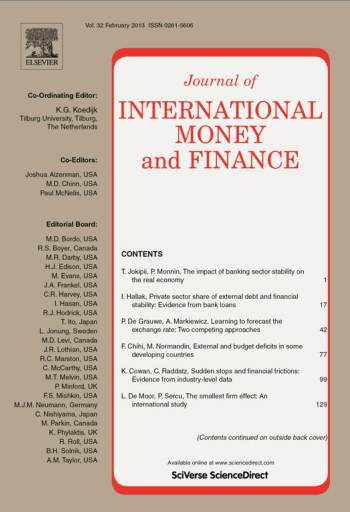
Conditional Macroeconomic Survey Forecasts: Revisions and Errors
in: Journal of International Money and Finance, November 2023
Abstract
Using data from the European Central Bank's Survey of Professional Forecasters and ECB/Eurosystem staff projections, we analyze the role of ex-ante conditioning variables for macroeconomic forecasts. In particular, we test to which extent the updating and ex-post performance of predictions for inflation, real GDP growth and unemployment are related to beliefs about future oil prices, exchange rates, interest rates and wage growth. While oil price and exchange rate predictions are updated more frequently than macroeconomic forecasts, the opposite is true for interest rate and wage growth expectations. Beliefs about future inflation are closely associated with oil price expectations, whereas expected interest rates are related to predictions of output growth and unemployment. Exchange rate predictions also matter for macroeconomic forecasts, albeit less so than the other variables. With regard to forecast errors, wage growth and GDP growth closely comove, but only during the period when interest rates are at the effective zero lower bound.

Evidence-based Support for Adaptation Policies in Emerging Economies
in: Low Carbon Economy, No. 1, 2023
Abstract
Climate change is increasingly evident, and the design of effective climate adaptation policies is important for regional and sectoral economic growth. We propose different modelling approaches to quantify the socio-economic impacts of climate change on three vulnerable countries (Kazakhstan, Georgia, and Vietnam) and design specific adaptations. We use a Dynamic General Equilibrium (DGE) model for Vietnam and an economy-energy-emission (E3) model for the other two countries. Our simulations until 2050 show that selected adaptation measures, in particular in the agricultural sector, have positive implications for GDP. However, some adaptation measures can even increase greenhouse gas emissions. Focusing on GDP alone can lead to welfare-reducing policy decisions.
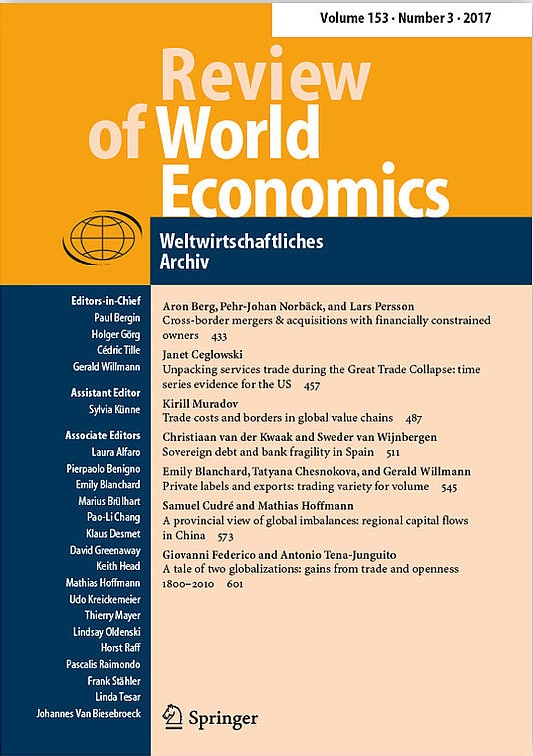
Monetary Policy in an Oil-dependent Economy in the Presence of Multiple Shocks
in: Review of World Economics, February 2023
Abstract
Russian monetary policy has been challenged by large and continuous private capital outflows and a sharp drop in oil prices during 2014. Both contributed to significant depreciation pressures on the ruble and led the central bank to give up its exchange rate management strategy. Against this background, this work estimates a small open economy model for Russia, featuring an oil price sector and extended by a specification of the foreign exchange market to correctly account for systematic central bank interventions. We find that shocks to the oil price and private capital flows substantially affect domestic variables such as inflation and output. Simulations for the estimated actual strategy and alternative regimes suggest that the vulnerability of the Russian economy to external shocks can substantially be lowered by adopting some form of inflation targeting. Strategies to target the nominal exchange rate or the ruble price of oil prove to be inferior.
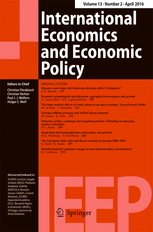
Business Cycle Characteristics of Mediterranean Economies: a Secular Trend and Cycle Dynamics Perspective
in: International Economics and Economic Policy, October 2022
Abstract
This study analyzes business cycle characteristics for all 20 major contemporaneous economies bordering the Mediterranean Sea based on annual real gross domestic product series for the period from 1960 to 2019. The region we investigate corresponds to the Mare Internum region of the Imperial Roman Empire during the Nerva-Antonine and early Severan dynasty, i.e., at the time of the maximum extent of the Roman Empire around 100 to 200 CE. The covered area encircles the Mediterranean, including economies now belonging to the European Union as well as acceding countries, Turkey, and the Middle East and North African economies. Using a components-deviation-cycle approach, we assess level trends and relative volatility of output. We also quantify the contribution of various factors to the business cycle variability within a region. We find cyclic commonalities and idiosyncrasies are related to ancient and colonial history and to contemporaneous trade relationships. Caliphate and Ottoman Empire membership as well as colonial rule in the twentieth century and contemporary Muslim share of population are the most promising predictors of business cycle commonalities in the region.
Working Papers
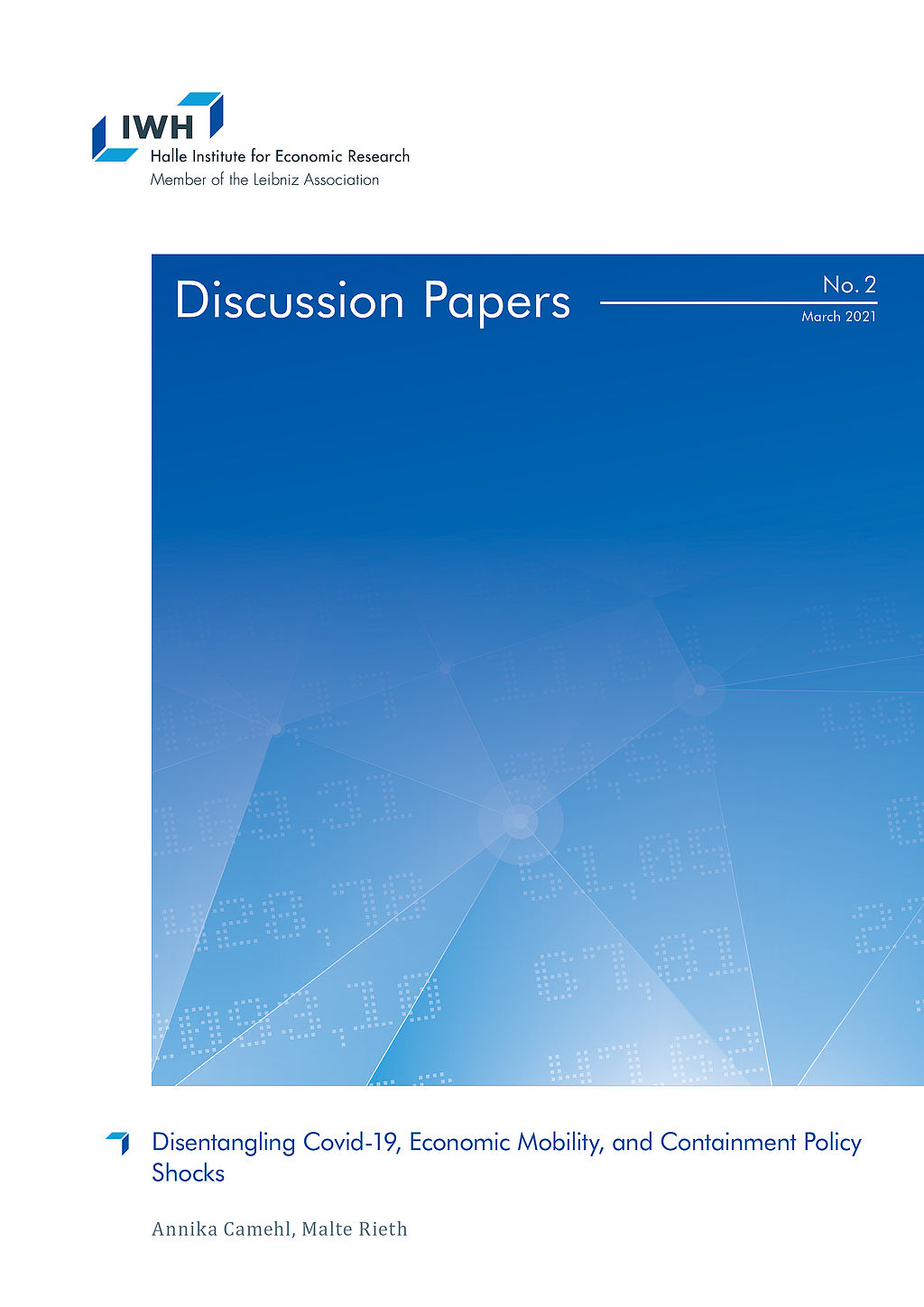
Disentangling Covid-19, Economic Mobility, and Containment Policy Shocks
in: IWH Discussion Papers, No. 2, 2021
Abstract
We study the dynamic impact of Covid-19, economic mobility, and containment policy shocks. We use Bayesian panel structural vector autoregressions with daily data for 44 countries, identified through sign and zero restrictions. Incidence and mobility shocks raise cases and deaths significantly for two months. Restrictive policy shocks lower mobility immediately, cases after one week, and deaths after three weeks. Non-pharmaceutical interventions explain half of the variation in mobility, cases, and deaths worldwide. These flattened the pandemic curve, while deepening the global mobility recession. The policy tradeoff is 1 p.p. less mobility per day for 9% fewer deaths after two months.
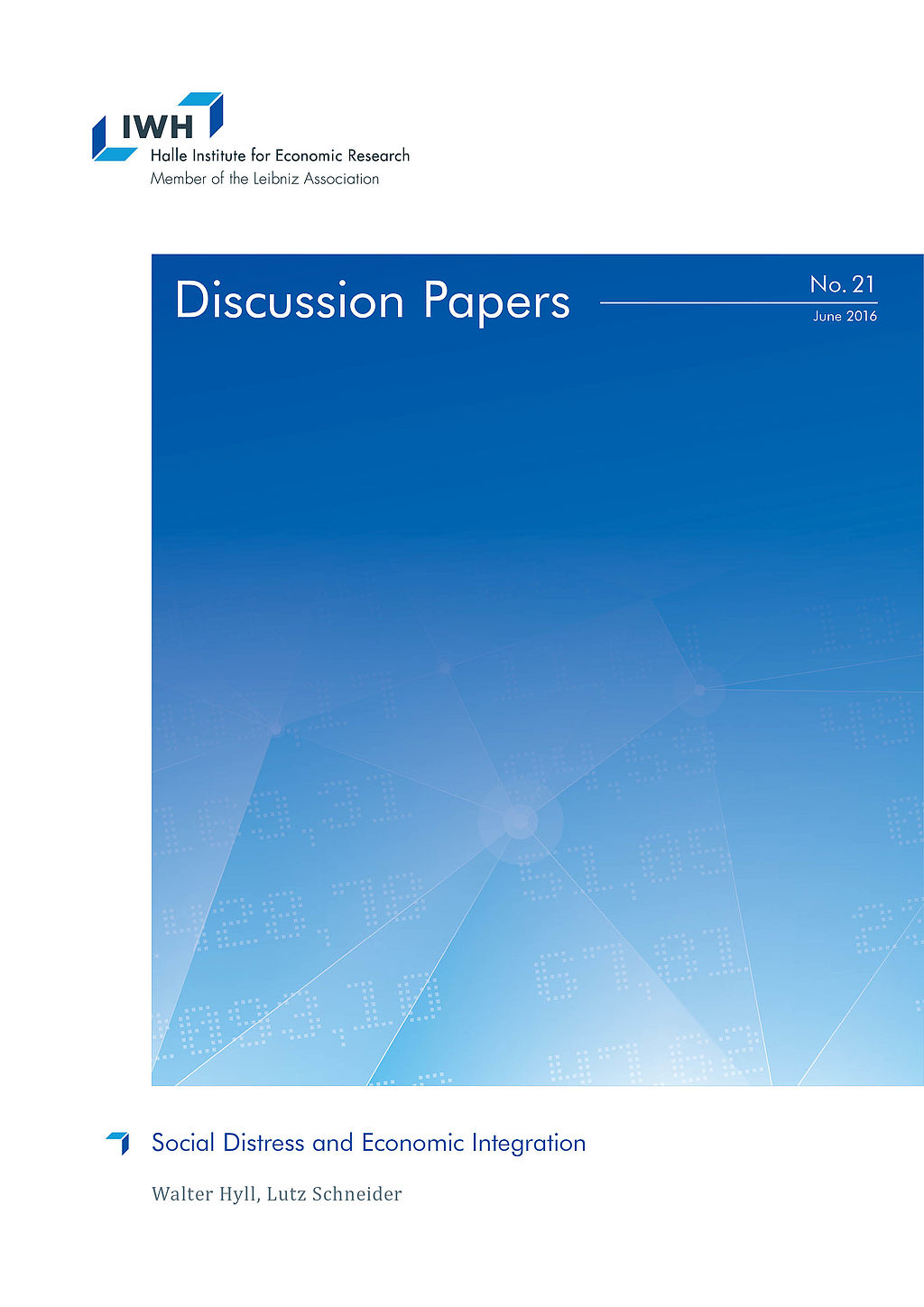
Exchange Rates and the Information Channel of Monetary Policy
in: IWH Discussion Papers, No. 17, 2020
Abstract
We disentangle the effects of monetary policy announcements on real economic variables into an interest rate shock component and a central bank information shock component. We identify both components using changes in interest rate futures and in exchange rates around monetary policy announcements. While the volatility of interest rate surprises declines around the Great Recession, the volatility of exchange rate changes increases. Making use of this heteroskedasticity, we estimate that a contractionary interest rate shock appreciates the dollar, increases the excess bond premium, and leads to a decline in prices and output, while a positive information shock appreciates the dollar, decreases prices and the excess bond premium, and increases output.
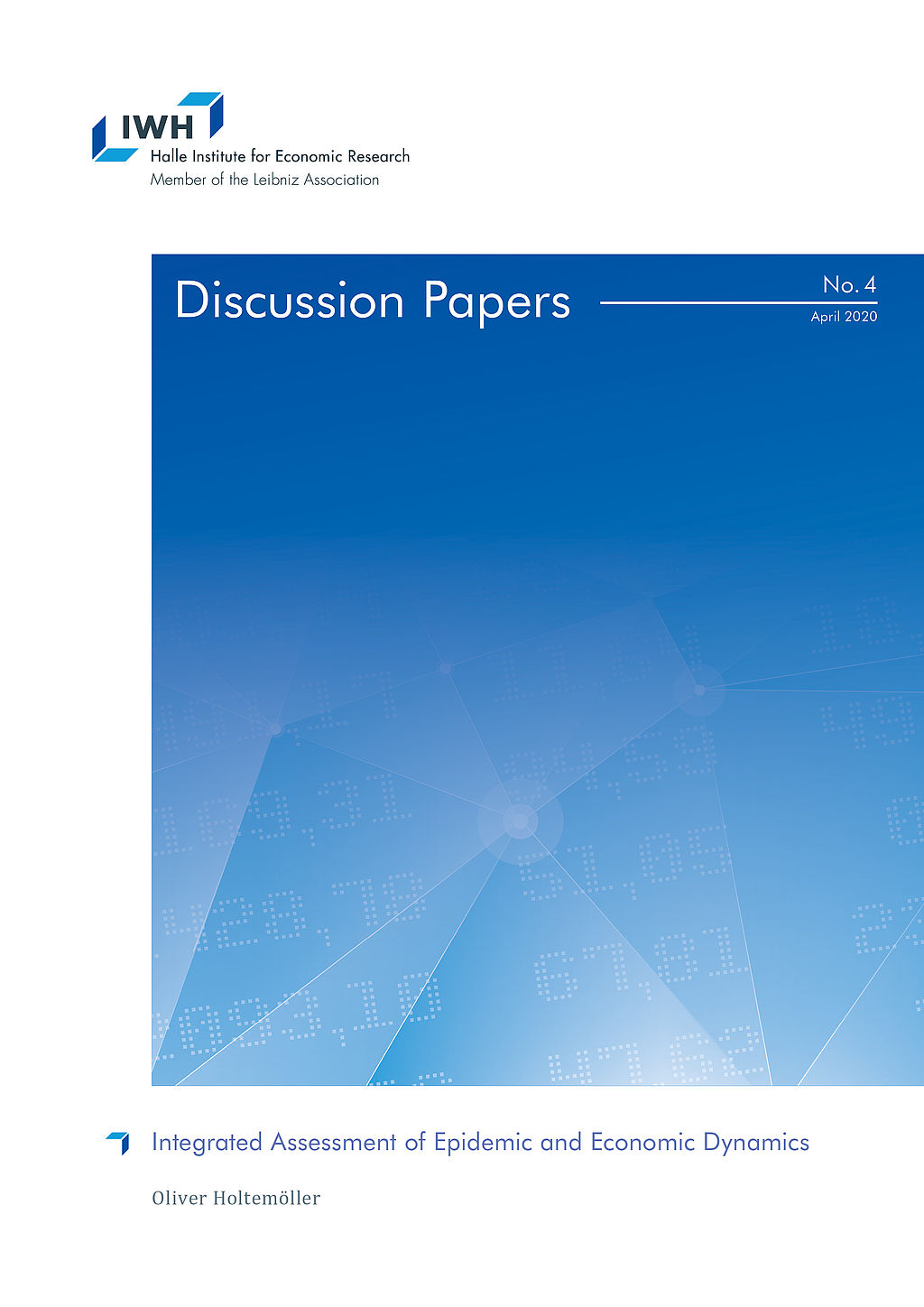
Integrated Assessment of Epidemic and Economic Dynamics
in: IWH Discussion Papers, No. 4, 2020
Abstract
In this paper, a simple integrated model for the joint assessment of epidemic and economic dynamics is developed. The model can be used to discuss mitigation policies like shutdown and testing. Since epidemics cause output losses due to a reduced labor force, temporarily reducing economic activity in order to prevent future losses can be welfare enhancing. Mitigation policies help to keep the number of people requiring intensive medical care below the capacity of the health system. The optimal policy is a mixture of temporary partial shutdown and intensive testing and isolation of infectious persons for an extended period of time.
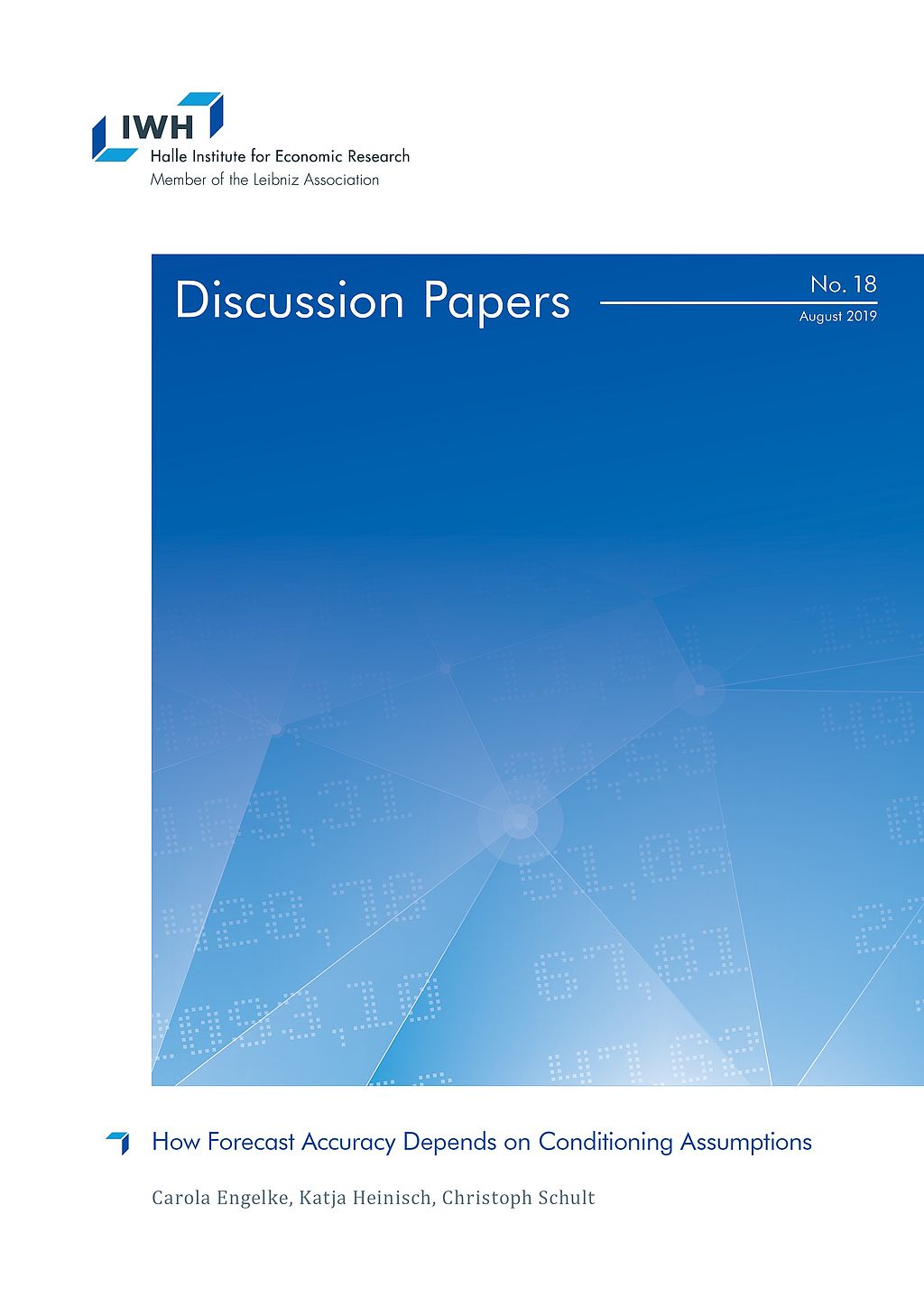
How Forecast Accuracy Depends on Conditioning Assumptions
in: IWH Discussion Papers, No. 18, 2019
Abstract
This paper examines the extent to which errors in economic forecasts are driven by initial assumptions that prove to be incorrect ex post. Therefore, we construct a new data set comprising an unbalanced panel of annual forecasts from different institutions forecasting German GDP and the underlying assumptions. We explicitly control for different forecast horizons to proxy the information available at the release date. Over 75% of squared errors of the GDP forecast comove with the squared errors in their underlying assumptions. The root mean squared forecast error for GDP in our regression sample of 1.52% could be reduced to 1.13% by setting all assumption errors to zero. This implies that the accuracy of the assumptions is of great importance and that forecasters should reveal the framework of their assumptions in order to obtain useful policy recommendations based on economic forecasts.
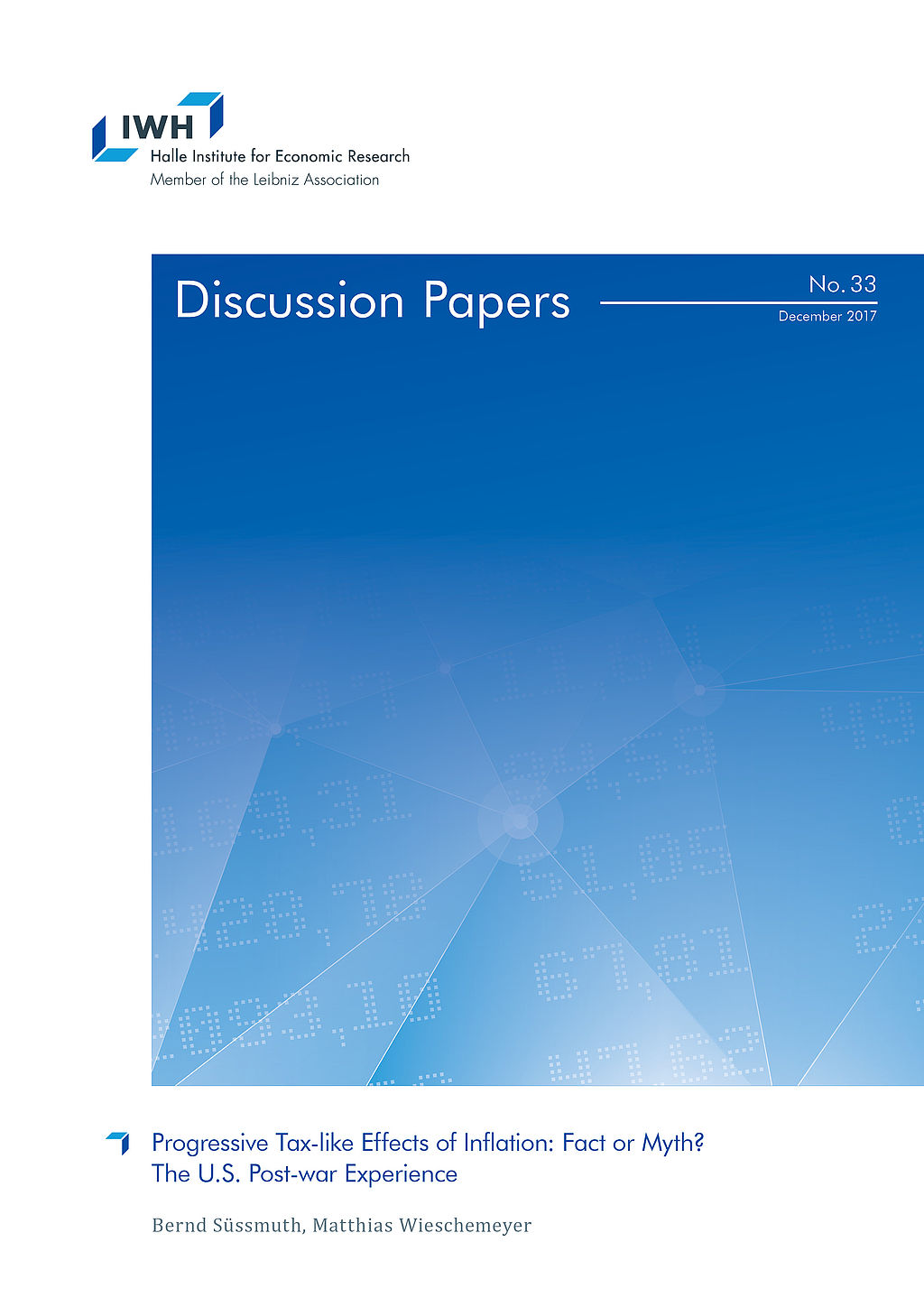
Progressive Tax-like Effects of Inflation: Fact or Myth? The U.S. Post-war Experience
in: IWH Discussion Papers, No. 33, 2017
Abstract
Inflation and earnings growth can push some tax payers into higher brackets in the absence of inflation-indexed schedules. Moreover, inflation may affect the composition of individuals’ income sources. As a result, depending on the relative tax burden of labour and capital, inflation may decrease or increase the difference between before-tax and after-tax income. However, whether some and if so which percentiles of the income distribution net benefit from inflation via taxation is a widely unexplored question. We make use of a novel dataset on U.S. pre-tax and post-tax income distribution series provided by Pike ty et al. (2018) for the years 1962 to 2014 to answer this question. To this end, we estimate local projections to quantify dynamic effects. We find that inflation shocks increase progressivity of taxation not only contemporaneously but also with some repercussion of several years after the shock. While particularly the bottom two quintiles gain in share, it is not the top but the fourth quintile that lastingly loses.

















